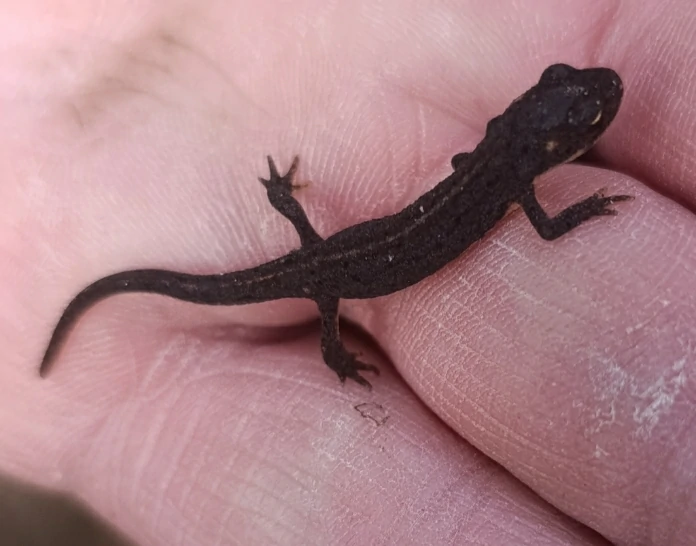You might notice a newt in your garden, pond, or near damp soil and wonder: is it harmful? Do newts bite, sting, or hurt plants? Or are they just small, harmless neighbors moving quietly through the environment?
Most newts are not harmful to people, pets, or gardens. They don’t bite aggressively, mess up plants, or spread diseases to humans. But some species do carry mild skin toxins that can be harmful if swallowed or if they touch open cuts. That’s why it’s best to admire them without handling too much.
Newts move slowly, eat insects, and prefer to stay hidden. For most people, they’re not a threat at all.
The only time harm comes in is if they’re handled carelessly, stressed, or mistaken for food by predators.
Do Newts Bite or Attack People?
Newts have tiny teeth, but they’re not made for biting humans. Their teeth are for gripping insects, worms, or larvae.
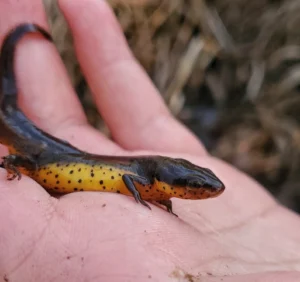
If you ever tried to hold one and it nipped, you’d barely feel more than a light pinch, if anything at all.
They’re not aggressive. Newts would rather stay still, blend in, and hide from danger.
In a garden or pond, you could sit for hours and never notice one unless you looked closely. This quiet, careful behavior makes them far from harmful.
Are Newts Dangerous for Pets?
You might wonder if a dog or cat sniffing around a pond could be harmed by a newt. Most of the time, pets are curious but don’t bother eating them.
If a dog or cat did try to put one in its mouth, some species produce mild skin toxins as protection.
For example, rough-skinned newts in North America carry a toxin called tetrodotoxin, which is strong if swallowed in large amounts.
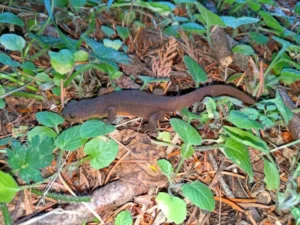
Still, in most everyday encounters, pets just sniff and walk away. The risk is small, but it’s a good reason to discourage pets from bothering amphibians.
Can Newts Harm Your Garden or Pond?
Newts don’t harm plants or garden setups. They don’t eat leaves, chew flowers, or dig holes. Instead, they’re helpers. They eat insects and larvae that might hurt plants.
A pond with newts often has fewer mosquitoes, fewer pests, and better natural balance.
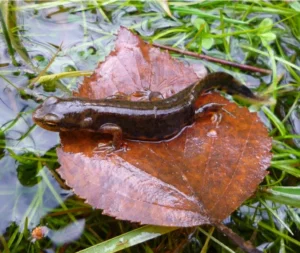
Think of them as little cleaners. While slugs or snails might chew your plants, newts hunt those same pests, cutting down damage without you needing chemicals.
In this way, they’re not only harmless but helpful.
Why Do Newts Have Toxins in Their Skin?
If newts don’t harm people or gardens, why do they have toxins? The answer is survival. In the wild, predators like birds, fish, and mammals may try to eat them.
To protect themselves, many newts let out mild toxins through their skin.
For example, the rough-skinned newt has enough toxin to stop most predators quickly. When threatened, it may even raise its head and tail to show its bright belly as a warning sign.
These toxins are rarely harmful to people unless swallowed or rubbed into eyes or open wounds.
So while toxins make them harmful to predators, they don’t make them harmful neighbors for humans.
What Happens If You Handle a Newt?
Have you ever picked up a newt out of curiosity? Most people feel nothing at all. Their skin may feel damp and cool, but the toxins don’t usually affect human skin unless you’ve got a cut.
Still, it’s smart to avoid too much handling.
Always wash your hands after, not because they’re dangerous, but because it’s better for both you and the newt.
Amphibians have delicate skin, and human hands can harm them with lotions, soap, or even dryness. Admiring them without picking them up often keeps everyone safe.
Are Newts Harmful in Large Numbers?
Some people worry: if there are lots of newts in a pond, could they become harmful? The answer is no. Even in groups, newts don’t destroy plants or mess up balance.
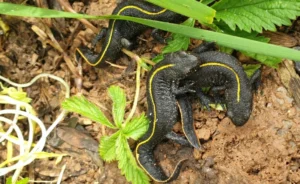
In fact, their presence usually means the pond is healthy.
If you see many newts together, it’s often during breeding season, when they gather in water. Afterward, they spread back into damp soil and mossy spots.
Far from harmful, this is a sign your pond is doing really well.
How Are Newts Different from Truly Harmful Animals?
It helps to compare. Harmful animals damage plants, bite people, or spread diseases. For example, slugs harm gardens, mosquitoes spread sickness, and rodents chew through homes.
Newts don’t do any of these things. They don’t dig, chew, or attack. Their toxins protect them from predators, not from people.
This shows clearly why calling them “harmful” doesn’t really fit.
Conclusion
Newts are not harmful to people, pets, or gardens. They move slowly, hide quietly, and eat pests that damage plants.
Some species produce toxins that can harm predators, but they’re not dangerous unless swallowed or handled carelessly.
In gardens and ponds, newts are helpful. They balance insect numbers, show when the environment is healthy, and cause no damage.
Around homes, they’re interesting to watch when kept with care.
Hi, my name is Ezra Mushala, i have been interested animals all my life. I am the main author and editor here at snakeinformer.com.

